25.5 months (with a break), 213 posts (including this one), and one 160 page book of my "best" posts.
My blogging continues at www.joshcanhelp.com.
Thanks for all of your support!
A step-by-step account of my eventual career in the alternative transportation industry. My trials and tribulations and rants and raves and opinions and actions.
25.5 months (with a break), 213 posts (including this one), and one 160 page book of my "best" posts.
Posted with love by
Josh C
0
comments
![]()
A couple cool, cool ones for you...
A junk made of junk (via Cnet):
The activists wanted more people to share their disgust about plastic litter that swirls, relatively unexplored, in continent-size patches of ocean.
To that end, they have built a motor-less craft from 15,000 recycled beverage bottles, fishing nets, and the cockpit of a Cessna, and are sailing it more than 2,000 miles from southern California to Hawaii.

The Dutch have created the Czeers MK1 – the first solar-powered speed boat – which will help bridge a friendship between the love of speed and the love of the environment....Reaching speeds of 30 knots and producing far less noise and pollution than its peers, this boat is 33 feet long and is covered in 150 square feet photovoltaic cells. $1.1 million.
...is fully powered by the integrated solar cells. It is absolutely gorgeous; the deep carbon fiber hue, combined with the orange interiors, and the sleek form give off an incredible James-Bondian vibe. It is also, quite likely, very expensive, as no price has been given, and only a limited number will be produced.

Posted with love by
Josh C
1 comments
![]()
I wanted to share a great riff Seth Godin had about retail packaging. While it doesn't directly have anything to do with transportation, I think you'll find some salient points (and, if you don't, I'll help you out). From Seth's blog:
Item 1: My Logitech cordless remote (which I like a lot) came in plastic, non-recyclable packaging that weighed twice as much as the remote itself.* The plastic was so well sealed and so thick that I actually broke a kitchen knife trying to open it. (*this is not hyperbole. I weighed it).
This is expensive, time-consuming and positions the product as extremely ungreen.
This packaging is the result of a paranoid retail buyer (the person who orders in bulk for the store, not the buyer at retail) demanding pilfer-proof packaging combined with a lazy brand manager choosing a lousy solution to the challenge presented by getting it into a retailer. "Make it pilfer-proof or we won't carry it," he says. The brand manager doesn't want to take a risk, so she packages it the way they packaged it when the device cost $1,000. Impregnable.
When you buy it from Amazon, of course, a cardboard sleeve would be sufficient. The manufacturer, though, only wants to have one sku, so Amazon sells the wasteful one as well.
So, why not compromise and shrink wrap it to a cardboard backad? A simple piece of cardboard, 8 x 10, impossible to fit under your jacket, much lighter, easy to recycle, cheaper and easier to ship.

Posted with love by
Josh C
1 comments
![]()

The 20kw electric motor can achieve a very reasonable 80mph, and will take you on travels up to 100 miles on any given charge. It takes about 6 hours for its lithium-ion battery to recharge fully and, as with most electric vehicles, it comes with a regenerative braking system. The package for all of this three-wheeled fun runs about $20,000 dollars.
VW has been talking for a long time about their L1 concept, so called because it uses a measly 1 liter of gasoline to go 100 km. For us Americans, that translates to about 230 miles per gallon. Of course, the amazing mileage comes at a price. The car is tiny, more of a tobaggon than a car. The single passenger actually sits behind the driver, like in a small airplane.


There are no rear view mirrors and it instead uses cameras and electronic displays. The rear wheels are close together to allow a streamlined body. The drag coefficient (Cd) is 0.159, compared to 0.30 for typical cars.
For light weight, the car uses an unpainted carbon fibre skin over a magnesium subframe. Individual components have been designed for low weight, including engine, transmission, suspension, wheels (carbon fibre), brakes (aluminium), hubs (titanium), bearings (ceramic), interior, and so on. Empty vehicle weight is 290 kg (639 lb).
The body and frame are designed with crush zones and roll-over protection, and the tandem seating means large side crush zones, and Volkswagen claims protection comparable to a GT racing car.
This fall, Mercedes-Benz will offer a new A-Class coupe - the A 160 CDI BlueEFFICIENCY - that gets 52mpg (U.S.). In the NEDC consumption calculation, the car comes in at 4.5 litres of fuel per 100 kilometres and emits just 119 grams of CO2 per kilometer. Those are the best ratings in the A-Class range, and the A 160 CDI BlueEFFICIENCY will still deliver 60 kW/82 hp.


Posted with love by
Josh C
1 comments
![]()
Wow, it only took two days for me to completely miss a day. I'm just not cut out for the heavy blogging.
So, today, I'm putting myself on trial. I bought a new car on Saturday and, if you know me well enough (or have paid attention to key posts) then you know the new ride isn't a Corolla, it isn't a Civic, and it probably isn't a Prius.
I bought a Honda Element.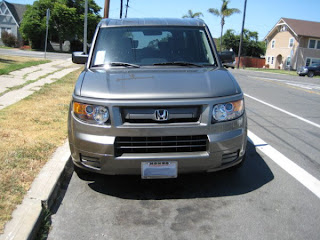
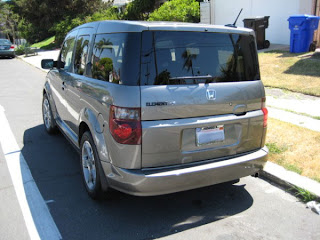
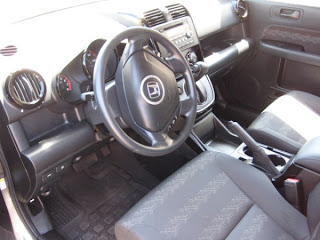
First, the conversational stuff...
Yes, I love it.
This is a vehicle I've been pining over for a good 5 years or so. For all of you out there who hate them, I hated them too... HATED them. But I rode in one and the owner, a good friend, loved it to death. And then, something in my brain changed and I knew I had to have one. It's everything I want and need in a vehicle in a very unique package.
The GTI had to go.
Poor Gretchen (yes, she has a name) was running a bit rough and had me a bit scared I might be stranded on the side of the road (again). A check engine light and a funny clunk in the front (along with a few other things) made it seem likely that a few thousand in repairs were coming up soon. I drove that picky German b*tch for 9 years and almost 112,000 miles and had very few problems up until about a year ago (maybe a bit before that).
The price was right, the car was right.
This is exactly how I would spec one of these new and there happened to be one on the lot, waiting for me (got there 4 days before I did). Fate?
I guess the big question is why would a green-guy like myself trade UP in vehicle size when I could afford something much smaller and more economical (like a smart [which I briefly considered]). I'll tell you why...
This gets the same MPG.
Yup, that's right, this little guy is rated at the same MPG as my GTI (actually, one less, 23 vs. 24). It's bigger, taller, clearly less aerodynamic, and it's getting about the same. Volkswagens are typically heavier cars and not very fuel efficient (unless they try).
It's an automatic.
Automatics are notoriously better for fuel efficiency because they switch to a high gear when you're not pushing on it. Driving my mom's big SUV around town back home, I found I could squeeze about 25 MPG out of a heavy V6 just because it was automatic (and had a MPG gauge). I find I'm much less aggressive in this car and tend to be about 5mph slower on the freeway; it's just easier to drive at a slower pace.
It can actually fit 4 people.
No more taking two cars because it's too cramped. The 3 other cars I ride around in besides my own are all 2-door and, if they have 4 seatbelts, it doesn't mean 4 adults should be in there.
It takes 87 octane.
And I'm dead sick of spending the money on premium.
So that's the deal.
To be perfectly honest, it was a big issue to buy a new-to-me car that didn't get much better miles-per-gallon. The gas prices are atrocious but my concern is and will continue to be actual consumption, not finances. I know, however, that the difference in overall consumption between 25 mpg and 30 mpg simply isn't enough to justify big sacrifices in my own life.
From spending my own time recycling to this blog to teaching others around me and volunteering for events, I do a lot to affect as many people as possible and, hopefully, convince a few more to make responsible choices. I replaced my bulbs, I control my speed on the freeway, I reuse plastic like a madman, I take cotton bags to the grocery store (when I remember), and I just recently started carpooling with a co-worker. Environmental choices are about more than just a car.
Trust me, I thought this one through. And I'll be the first one with an aftermarket hybrid kit when a solid, tested kit comes out... that or a low-emissions diesel engine from Honda!
Posted with love by
Josh C
2
comments
![]()
First up, great news from Audi via Rueters:
Audi, the luxury unit of Volkswagen, will make cars with no exhaust emissions within ten years, its top executive has told a German weekly. Rupert Stadler told Welt am Sonntag in an interview published on Sunday that he saw great opportunities in electric cars and expected diesel and battery technology to dominate in the coming five to ten years.
.jpg)
Created by noted car designer Henrik Fisker, the ultra cool Karma is a sleek, power packed eco-luxury ride. The Karma’s performance specs rev out at 0-60 mph in 6 seconds, and a top speed of 125 mph. At $80,000 USD, The car is a plug-in hybrid based on technology of Quantum Technologies. The Q DRIVE consists of a small gasoline engine which in turn charges the lithium battery packs in the car. According to Fisker, if charged properly, the hybrid would need to use no more than a fuel tank per year, quite a claim!



Posted with love by
Josh C
2
comments
![]()
One of my only regular commenters (in fact, my only one recently) sent me a note the other day...
yo update your blog.. wtf man.. how can i learn anything without you??
Want to do something about the environment and the energy crisis? Don't worry about the difference between 30 and 35 MPG on your compact sedan, stop buying things that need to be shipped. You're out-of-season fruit and trendy clothing made in Europe does more damage than you could ever do with your own car.
UPS (NYSE: UPS) today announced it has ordered 200 hybrid electric vehicles (HEVs) - the largest commercial order of such trucks by any company - in addition to another 300 Compressed Natural Gas (CNG) vehicles for its U.S. delivery fleet.

UPS (NYSE:UPS) today announced it was adding 306 alternative fuel vehicles to its "green fleet" by placing an order for 167 Compressed Natural Gas (CNG) delivery trucks while taking delivery of 139 new propane delivery trucks in North America. Additionally, the company has launched an initiative to use biodiesel fuel in its ground support vehicles at the UPS Worldport® air hub in Louisville.
New delivery trucks expected to save fuel, reduce harmful emissions. The U.S. Department of Energy's (DOE) National Renewable Energy Laboratory (NREL) is collecting and analyzing maintenance, fuel economy and other vehicle performance data from 50 UPS hybrid diesel step delivery vans powered by an Eaton Corp. electric hybrid propulsion system.
The U.S. Environmental Protection Agency (EPA) today unveiled the first-ever series hydraulic hybrid diesel urban delivery vehicle, which will provide dramatic improvements in fuel economy and in emission reductions. The development of the hydraulic hybrid is the result of a partnership between the EPA, U.S. Army, UPS, International Truck and Engine Corporation and Eaton Corporation.
Posted with love by
Josh C
2
comments
![]()
That's the headline over at the Wired Science blog.
It should come as no surprise to anyone that stays up on this topic that biofuels are looking less and less like what we need and more and more like the same problem that we have now just waiting to re-happen. It's the classic push-pull scenario where addressing one problem causes another serious one to appear. Biofuels are a very interesting sector of technology, it's a great lesson in thermodynamics to see machines (mechanical) powered by the same thing that powers other machines (biological), and 60+ MPG is a great thing but you can't mess with a necessity (food supply) to power a non-essential (sorry, but in the grand scheme of things, planes, trains, and automobiles are non-essential).
In an interview on NBC's Meet the Press, the Democratic presidential candidate said "there's no doubt that biofuels may be contributing" to falling food supplies and rising prices.
"We've got a serious food problem around the world. We've got rising food prices here in the United States. In other countries we're seeing riots because of the lack of food supplies. So this is something that we're going to have to deal with," said Obama.
Corn growers are especially powerful in Obama's home state of Illinois, and the candidate has long been a biofuel booster -- which makes his comments on Meet the Press all the more welcome.
Posted with love by
Josh C
0
comments
![]()

This is my Google Analytics data for 2/10/08 through today. I pulled it the other day and was very surprised to see such an international following.
I'm posting this, partly because I think it's fascinating how small the world has become but also because this is a very symbolic image (and only coincidental that the color is green). This tells me that people care, people want to know, people want to learn. All over the globe, human beings are re-thinking what they considered to be the truth and reconsidering their ideas of "the good life" and "success" and "happiness." Consciousness is spreading...
Thank you to my subscribers, thank you to my friends, and thank you to anyone who learned something important on my little (very, very little) slice of the web.
<><><><><><><><><>
Just a few quick ones today because I'm dead sick of the keyboard and mouse today.
First, post number two about a possible re-make of the BMW Isetta in EV form. Caught my attention on Ecogeek, they got it from AutoBlogGreen who got it from EDTA who got it from Lexis Nexis. Long line to get it here... thankfully SOMEONE is doing the dirty work.
Ecogeek:
A few bits of information have been leaking out here and there about BMW's plans to create an all-electric, lithium-ion two-seater for the European and American market. It seems to be possible that it will be a re-incarnation of BMW's tiny Isetta...but there are also indications that it will be co-branded with Smart.


A UK company has revealed a retro-fit hybrid conversion kit that has the potential to cut exhaust emissions in existing cars by nearly 40%, and improve fuel economy by 60%. The system, developed by the Motor Industry Research Association (MIRA), features a removable battery pack, arranged into three portable 30kW cassettes, which upgrade existing "conventional" vehicles into hybrids.
According to MIRA, the test model achieves an average of 64mpg (up from 39mpg), while top speed and acceleration remain similar to a standard Fabia.
Posted with love by
Josh C
0
comments
![]()
Like any good green-type would do, I attended the San Diego Earth Day 2008 event on the 20th of this month (4/20, get it?). It was held in Balboa Park along the museum walk, a beautiful place to have any type of outdoor event. I heard about it from a friend who described it as a popular San Diego event that was not to be missed (not those exact words). The girl and I decided to spend a bit of our minimal free time mingling with the locals and seeing what this whole E-Day thing was about. By the end of it, we were glad to get out of the house but the whole thing was basically a let-down. 
We got there right about when it started so, thankfully, we missed the bulk of the crowds (and the parking nightmare). There was a parade gearing up with all sorts of things ranging from cute little kids dressed in random, unrelated costumes to the stilt-walker above (a early-teens girl who appeared to have unnaturally long legs to begin with). We made our way down the promenade and saw booth after booth with everything ranging from organic lotion to investment options to window coverings. I was immediately struck by how unrelated to the earth and the green movement that these booths were. To give you an idea, check out this list of Earth Day exhibitors that were at the Park that day. Just a few generally non-green-related groups were:
AIG AMERICAN GENERAL LIFE & ACCIDENT INSURANCE COMPANY
AIG Financial Advisor
Animal Protection & Rescue League
Animals Asia Foundation
Atheist Coalition
B "N" B Kettle Corn
Back Country Land Trust
Baha'i Faith
Listen, I like atheists and kettle corn just as much as the next guy but they really have little to do with Earth Day. ... but I digress...
... but I digress...
We made our way down the promenade and ended up in front of the MoMA. We paused for a moment, just long enough to be accosted by the "are you registered to vote" crew. I gave my rote "..mumble, mumble..." and moved on.
EDCO waste management had a neat eye-catcher...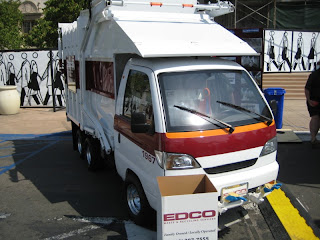
 After chatting with a nice woman about some premium acai juice (bottled deceptively but creatively in wine bottles), we decided to make our way toward the west end of the park, hoping to run into the friends we were supposed to be meeting. On the way, a big, colorful sign caught my eye. No surprise that this happened because it was the same old "shock and awe" anti-choice assholes with that tired picture of the mutilated baby's head held with tongs (I tried to find the image but then I realized that I didn't really want to link to their site). Truth be told, this was the second ridiculous display of poor taste we had seen that day in just 30 minutes.
After chatting with a nice woman about some premium acai juice (bottled deceptively but creatively in wine bottles), we decided to make our way toward the west end of the park, hoping to run into the friends we were supposed to be meeting. On the way, a big, colorful sign caught my eye. No surprise that this happened because it was the same old "shock and awe" anti-choice assholes with that tired picture of the mutilated baby's head held with tongs (I tried to find the image but then I realized that I didn't really want to link to their site). Truth be told, this was the second ridiculous display of poor taste we had seen that day in just 30 minutes.
With no booth and no tact but an equal right to be there, a group of anti-choice sign-holders had invaded the Earth Day event. Holding giant images of late-term aborted fetuses in an attempt to sicken everyone into making a social and political choice is a boring, asinine way to make an unnecessary point. I'm really going to fly off-topic here so I'll say this: they were not harming anyone and they were not screaming and shouting but there should have been some kind of exhibitor restriction. If they want to spread their message they need to do so with their own booth, not upstaging the efforts of the people around them who are working towards a different cause. Maybe we could have a "Ban Legal Medical Procedures Day" and they can show up and wave their silly signs at like-minded people.
ANYways...
Right after that, we stumbled upon the San Diego recycling department who had this hilarious recycling bin costume on display (but no one to wear it... Anna said no): I had a few questions about residential recycling and talked to a very helpful guy who explained the process and how it's going to be mandatory in 2010 for all housing units in San Diego to have recycle bins. What I didn't know is that landlords have to pay to have recycling picked up. I thought the materials that get picked up were finally as valuable as the cost required to pick them up. It shines a light on the reason why we don't have recycling bins (our landlord said that before we moved in, our apartment complex [of 12 units] had "lost the privilege of having recycling bins because people were throwing away the wrong things." hrmmmm). I guess that's yet another bill to look forward to when we have a house.
I had a few questions about residential recycling and talked to a very helpful guy who explained the process and how it's going to be mandatory in 2010 for all housing units in San Diego to have recycle bins. What I didn't know is that landlords have to pay to have recycling picked up. I thought the materials that get picked up were finally as valuable as the cost required to pick them up. It shines a light on the reason why we don't have recycling bins (our landlord said that before we moved in, our apartment complex [of 12 units] had "lost the privilege of having recycling bins because people were throwing away the wrong things." hrmmmm). I guess that's yet another bill to look forward to when we have a house.
After that we made our way past a few more anti-choicers and security guards who were trying their damnedest to thwart their plans; the whole scene was ridiculous.
We signed a petition to raise diesel truck efficiency (relating to interstate transport), saw a neat both on green remodeling, and then made our way to the Aircraft/Automobile museum section. I was expecting a really great display of eco-vehicles, both home-made and manufactured. After our experience that day and my disappointing volunteer experience previously (at the Automobile Museum), I'm not sure why I had my hopes so high.
There were things to see, no doubt, but it was maybe 9 or 10 vehicles, most of which did not have their owners/builders nearby. There was nothing from Zap/Zebra (one of which attended the previously mentioned event), no Smart car dealers (there is one in San Diego) and no plug-in hybrid exhibits (like the one at SDSU and the Santa Monica event I went to).
I liked the blue Toyota converted to all-electric...

... and the German-built "Twike" was very interesting...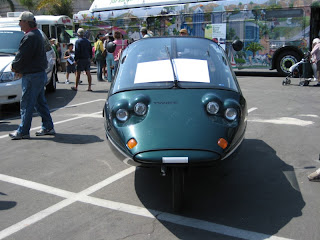
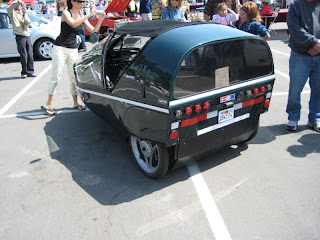
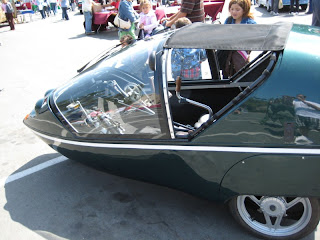

...and I had to have love for an EV rabbit convertable ("Da Lectric Spidey")...
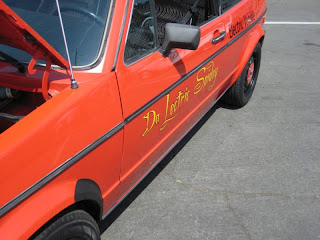 ...but the others were just unremarkable. A "bamboo van" (powered by bamboo somehow, I guess)...
...but the others were just unremarkable. A "bamboo van" (powered by bamboo somehow, I guess)...
 ... an electric-converted relic...
... an electric-converted relic... ... and this:
... and this: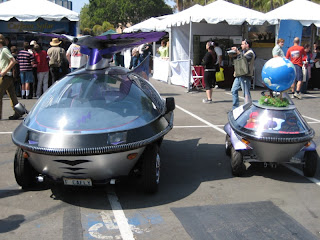
 Phoenix showed up with a little utility truck that was neat:
Phoenix showed up with a little utility truck that was neat: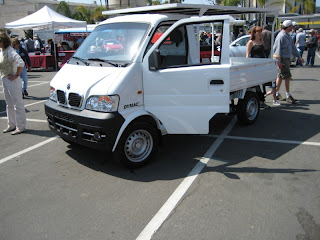 ... but it was really a let-down.
... but it was really a let-down.
Events like this are a perfect way to get the attention of a big group of people. Not just any people, though, people who might be open to changing their lifestyle a little (or a lot) to make the right choices for our planet. This is a VERY important opportunity, one that shouldn't be taken lightly. The event was set in a great location and the turn-out was really big, even in the morning. But, in the case of sustainable transportation, people were left empty-handed. There is no action to be taken, nothing to do about it, nowhere to go. There were a million and one products to buy but nothing you could do to change your MPG or method of transportation (that's not entirely true... there was an MTS booth as well).
It's hard to say who to blame for this - if that's what needs to be done. Maybe EarthWorks busted their butts trying to get people out there with no response. Maybe they trusted someone else would do it. Maybe they did nothing. Whatever happened, this was a lost opportunity. At the very least I would hope a few green-conscious car dealers in the area would be available to ask questions and hawk their hybrids or sub-compacts. Instead, there were a few tinkerers and their projects drowning in a sea of exhibitors that may or may not have anything to do with saving the environments.
All I know is that I came there for the green cars and left with a few fliers, a sample of Sun Chips, and a nice tan.
Oh, and a picture of a Rolls Royce parked on Park Ave with a bottle of Grey Poupon in the console. Bravo!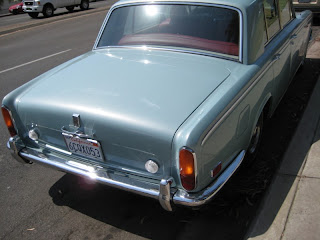

Posted with love by
Josh C
2
comments
![]()
After you're done reading the very informative interview below, please take the time to fill this little guy out.
Posted with love by
Josh C
0
comments
![]()
Hey, look! I talked another professor into doing work for me! I guess it's only appropriate since I'm doing work for him, right?
 Dr. Beauvais is my research adviser at San Diego State and I've been in his group for almost a year and a half. The research is concentrated on creating crystalline solids that will, hopefully, assist in gas storage (particularly hydrogen).
Dr. Beauvais is my research adviser at San Diego State and I've been in his group for almost a year and a half. The research is concentrated on creating crystalline solids that will, hopefully, assist in gas storage (particularly hydrogen). Wow, that is a very broad question. Regarding the state of our environment, I would say that we (meaning the United States) have made great strides in some areas but we have a long way to go. For example, recycling programs are ubiquitous and we do a good job on metals and paper, but too many plastics are not being recycled. Combine the poor recycling of plastics with the use of plastics in packaging, and that generates a large amount of waste. We need to either re-use more plastics, most of which are produced from fossil fuels, or move to renewable plastics made other sources. I think that we have done a good job reducing sulfur and nitrogen oxides but we have not done enough to reduce mercury emissions.
Regarding the existence of global warming, I would have to say that all of the reports I have seen from credible scientists and scientific organizations has supported global warming. I am not a climatologist, so I am not ready to argue the minute details of global warming. However, I can do a quick calculation of the amount of CO2 released from gas combustion in this country per year and the number is staggering. The US consumes 400 million gallons of gas per day which results in the release of 884 gigagrams of CO2. Consider that CO2 cannot be removed from the atmosphere rapidly and that the carbon obtained from petroleum sources has been sequestered underground for millions of years. Thus, we will increase the concentration of CO2 in the atmosphere by burning oil. CO2 is a greenhouse gas. Add these facts up, and global warming does not seem so far-fetched. Therefore, I consider global warming a serious issue.
Are you considering wild animals, pets, and other living organisms as inhabitants or only humans? For now, let’s focus on humans.
Of course, there are many things that people can do to reduce their environmental footprint. I recycle as much as possible, I purchase locally produced items/foods whenever possible, I have a 10 minute commute, I carpool, etc. Consider the 400 million gallons of gasoline that are used everyday in the US. A good portion of that must be devoted to transporting manufactured goods, food, commodities, etc, and a good portion is probably transported by trucks. The more efficient means of moving goods is by rail, but the rail system in this county has deteriorated. If people purchased locally sourced items, we could reduce fuel consumption while at the same time improving local economies. Why do people want to live an hour away from work? Sure, I understand the desire for more space and bigger homes, but do you really enjoy sitting in traffic and paying $20 a day for gas? In most of the county, we do not even offer commuter trains that parallel major highways.
I would love to install photovoltaic cells on my house, but the prices are too high and the efficiency too low. I believe that we should see improvements on both of those factors in the next few years as alternatives to silicon-based systems are commercialized. If a large portion of the country generated their own power, it would go a long way to reducing one of our major sources of various emissions and fuel consumption–power generation.
It would be great to retrofit our sprawling cities with mass transit systems. However, I do not think that works. You really need to have the transit in place at the same time you are developing a city. As an alternative, I think it worth the effort to produce cars that are as fuel efficient as possible and to target cleaner fuels such as hydrogen. Ignoring the environmental issues, we need to find an alternative transportation fuel to replace gasoline for reasons of national security. Our dependence on gasoline means the continued support of repressive totalitarian societies, such as Saudi Arabia. In addition, as people in China and India seek a lifestyle similar to that of the developed world, the demand for oil can only increase.
We need to determine how we want to address the future energy needs of our country and the world. We can estimate how much energy we will need, and we need to have a plan for supplying that energy. We will have to revisit nuclear energy because it has zero emissions, as long as we have the correct regulations and a permanent waste storage facility, but there is a limited supply of uranium. Ultimately, we need to improve photovoltaic cells so that we can generate power at the point of use and reduce the need for large power plants. We need to couple the power generation from solar cells to a power storage mechanism because solar power is limited to specific times and places. For example, use solar energy to pump water uphill during the day and recover the power at night by using hydroelectric generators. Or, use solar power to split water to generate hydrogen and then use internal combustion or fuel cells to generate electricity.
Solar power. It’s clean and renewable. Power can be generated where it is needed or converted to a storage medium. But, we need to develop solar cells with better efficiencies and costs. It would be nice to not need silicon because of the energy required to generate pure material. The solar cells will need to be flexible and easy to integrate into building materials.
Get rid of the upper speed limit on highways and apply a well-enforced minimum speed limit.
Or, increase the average fuel efficiency by 10 mpg.
Public transportation is important but I think it is nearly futile to build systems in cities like San Diego, LA, Houston, etc. The cities are spread out, land is expensive, and the resulting transit systems take too long for most uses.
Posted with love by
Josh C
0
comments
![]()
An unfortunate update to a previous post. Autoblog says:
The word came down yesterday from Auto Motor und Sport that the Volkswagen TDI hybrid Golf concept that debuted in Geneva wouldn't make the transition to production. According to the print edition of the German rag (translation courtesy of TTAC), the "forward-looking diesel-hybrid is already a thing of the past." That came as a surprise considering how well the concept was received and rumblings we heard from VW's people on the floor that the 69-mpg (European cycle) Golf was destined for the road. We shot off an email to a Volkswagen exec here in the States who responded by saying that, "It was just a concept. No plans to produce were announced." Too bad. Guess we'll have to make due with the gasoline-hybrid Golf that's due out in the next few years.
Posted with love by
Josh C
0
comments
![]()
My last post on Friday (Introduction to Link Love posts with examples) had an article on MSNBC/Careerbuilder about "green collar jobs". I would like to, again, reiterate the fact that I am rue to link to anything on Careerbuilder but you're not likely to be inundated with spam by simply clicking on the link (like you will by signing up for their loosely titled "service") so I'll make an exception.
First off, it's important to point out that this article is about as far from me, with respect to intent, as it could possibly be. The point of this article is to point out that there's this great new sector that's likely to grow based on sound-bites from our presidential candidates. The article says nothing about personal responsibility, purpose in life, or altruism through self-sacrifice. Careerbuilder is certainly not going to help you find meaning in your work by guiding you in a direction to make a difference in any way. But I digress; this post is not meant to inaugurate "Bash CB Day."
The article talks, first, about the possibility of new jobs appearing based on forward-looking statements by Obama, Clinton, and McCain. I'll just quote the one that makes any difference whatsoever:
Democratic Sen. Barack Obama -- "We've also got to do more to create the green jobs that are jobs of the future. My energy plan will put $150 billion over 10 years into establishing a green energy sector that will create up to 5 million new jobs over the next two decades."
Posted with love by
Josh C
2
comments
![]()
Link Love is when a blogger can't/won't come up with original content. At the expense of losing momentum he or she might have, they post links to other blogs and sites of note to make it appear as though they're so busy researching the next post that they can hardly be bothered with the current one.
This technique might, on the surface, appear to be creeping laziness but, upon closer examination, the value is clear.
You, the reader, can't be bothered with following all the other great blogs out there about your topic of interest. We, the bloggers, understand the position you are in and make it our responsibility to go out there and get that info. We're on so many different sites throughout the week that it's hard to cut everything away and post the really interesting stuff (or at least the stuff we have something to say about). Sometimes, there's just too much stuff that we want you to know about and we have to take some time to recover from the information overload.
Let me give you an example (to illustrate my point, nothing more). A good Link Love post from joshisjosh,com might look like this:
-=-=-=-=-=-=-=-=-=-=-
Hey everyone!
Lots of stuff to get to so let's jump right in!
An article on MSNBC/Careerbuilder about "green collar jobs" was just posted today. I'll ignore the fact that Careerbuilder is the WORST place to go to find a job in ANY SECTOR and just say that the article is interesting. I'll write more about it on Monday... stay tuned.
Carectomy.com is looking to remove your car from you. They have a few ways of going about it:
8 reasons to start cycling
What is pilgrimage circa 2008?
A promising trend
Thinking about a new car? I am and, fortuitously enough, Ecogeek is trying to convince me to wait until 2010. By then, I might be able to avoid financing (I know, buying a new car in cash is blasphemy in this country)!
Speaking of great new cars, this little Fiat posted at Autobloggreen.com is AWESOME! 56 MPG diesel and a stunner in the looks department:

And, no link love for my blog would be complete without a few from Inhabitat, one of my favorite feeds out there. I'm considering moving up to San Fran just to write for them (just kidding, Anna):
Biofuel from algae
Strange-looking but neat little cube from Toyota, the Hi-CT
Just in case you thought that transportation HAD to be inefficient as a rule
-=-=-=-=-=-=-=-=-=-=-
And that, my friends, is what a Link Love post looks like. This example was short because I didn't want you to think I was ACTUALLY posting a Link Love. Stay tuned for more in-depth analysis of this trend and others like it.
;)
Posted with love by
Josh C
0
comments
![]()
What does Zen mean to you?
I recently took a (somewhat challenging [surprisingly]) course in Chinese Philosophy recently and was introduced to the true and original idea of Zen. Not to imply that I'm somehow better suited to write about this than someone else; you could get the same information from wikipedia.
But I digress.
Zen is short for Zen Buddhism (or Chan Buddhism), a collection of principles of thinking devoted to letting go of all pre-conceived notions and, basically, going with the flow. By accepting Zen into your life you move past emotions and hang-ups and stress and worry in order to find a universal flow. It's a beautiful way of thinking but one I find myself very far from when I am cruising down a 6-lane freeway in SoCal. There is not a lot of Zen to be found on I-5, trust me.
One company, however, is looking to change that idea. Enter ZENNcars.
Here's a pic of one I saw at the Santa Monica Alt Fuel Expo:
ZENN stands for Zero Emissions No Noise and is poised to be the first mass-produced, usable, and widely-available electric car manufacturer to come to the states. Their brand credo:
Since we first began to walk, we have loved the feeling of movement.
To get around and see the world.
To be free.
Cars have given us mobility.
But with the heavy costs of pollution and oil dependency.
ZENN is about returning to the purity of that original feeling.
ZENN may look like a car, but it refuses to act like one.
You'll experience the simple joy of moving freely.
With silent, exhilarating acceleration
ZENN will quietly change the way you think about getting from A to B.
The air is clean and your conscience is clear.
ZENN is a car that, while it runs on electricity, is fueled by optimism,
The belief that individuals can make a difference,
That we can do better.
ZENN is enlightened mobility
What’s even more interesting are reports that the company plans on releasing a ‘proper’ highway legal electric vehicle next year called the cityZenn, based around EEstor technology. We’re talking 80 mph and 250 mile range, rechargeable in less than 5 minutes. Yeah yeah, I know, believe it when we see it, but hey, these guys seem kosher and have actually invested substantial money in the EEstore company. We’ll see, eh?
"We need to move away from chemical battery technology to a whole new way of storing energy for electric vehicles, with a solid infrastructure to support global roll out," said Ian Clifford, CEO of Zenn, at the company's annual general meeting.
"Through their massive improvements on energy storage and power density, EEStor will virtually eliminate all of the shortcomings of existing and proposed chemical battery technology."

Posted with love by
Josh C
0
comments
![]()